- Home
- Garth Stein
Art of Racing in the Rain, The Page 8
Art of Racing in the Rain, The Read online
Page 8
We sat on the berm for quite a long time, not speaking or anything. He seemed upset, and when he was upset, I knew the best thing I could do was be available for him. So I lay next to him and waited.
Parking lots are weird places. People love their cars so much when they are moving, but they hurry away from them so quickly when they stop moving. People are loath to sit in a parked car for long. They are afraid someone might judge them for it, I think. The only people who sit in parked cars are police and stalkers, and sometimes taxi drivers on a break, but usually only when they’re eating. Whereas me, I can sit in a parked car for hours and nobody thinks to ask. Odd. I could be a stalker dog, and then what would happen? But in that hospital parking lot, with its very black blacktop, warm like a sweater just removed, and its very white white lines painted with surgical care, people parked their cars and ran from them. Sprinted into the building. Or scurried out of the building and into their cars, quick to drive away with no mirror adjustment, no assessment of gauges, like a getaway car.
Denny and I sat at length and watched them, the comers and goers, and did nothing more than breathe; we did not need conversation to communicate with each other. After a while, a car pulled into the parking lot and parked near us. It was beautiful, a 1974 Alfa Romeo GTV in pine green with a factory-installed fabric sunroof, in mint condition. Mike got out slowly and walked toward us.
I greeted him, and he gave me a perfunctory pat on the head. He continued over to Denny and sat down in my spot on the berm. I tried to muster some joy because the mood was definitely down, but Mike pushed me away when I went to nuzzle him.
“I appreciate this, Mike,” Denny said.
“Hey, man, no problem. What about Zoë?”
“Eve’s dad took her to their house and put her to bed.”
Mike nodded. The crickets were louder than the traffic from the nearby Interstate 405, but not by much. We listened to them, a concert of crickets, wind, leaves, cars, and fans on the roof of the hospital building.
Here’s why I will be a good person. Because I listen. I cannot speak, so I listen very well. I never interrupt, I never deflect the course of the conversation with a comment of my own. People, if you pay attention to them, change the direction of one another’s conversations constantly. It’s like having a passenger in your car who suddenly grabs the steering wheel and turns you down a side street. For instance, if we met at a party and I wanted to tell you a story about the time I needed to get a soccer ball in my neighbor’s yard but his dog chased me and I had to jump into a swimming pool to escape, and I began telling the story, you, hearing the words “soccer” and “neighbor” in the same sentence, might interrupt and mention that your childhood neighbor was Pelé, the famous soccer player, and I might be courteous and say, Didn’t he play for the Cosmos of New York? Did you grow up in New York? And you might reply that, no, you grew up in Brazil on the streets of Três Corações with Pelé, and I might say, I thought you were from Tennessee, and you might say not originally, and then go on to outline your genealogy at length. So my initial conversational gambit—that I had a funny story about being chased by my neighbor’s dog—would be totally lost, and only because you had to tell me all about Pelé. Learn to listen! I beg of you. Pretend you are a dog like me and listen to other people rather than steal their stories.
I listened that night and I heard.
“How long will they keep her?” Mike asked.
“They might not even do a biopsy. They might just go in and get it. Malignant or not, it’s still causing problems. The headaches, the nausea, the mood swings.”
“Really,” Mike deadpanned. “Mood swings? Maybe my wife has a tumor.”
It was a joke line, a throwaway, but Denny didn’t have a sense of humor that night. He said sharply, “It’s not a tumor, Mike. It’s a mass. It’s not a tumor until they test it.”
“Sorry,” Mike said. “I was…Sorry.” He grabbed me by the scruff and gave me a shake. “Really rough,” he said. “I’d be freaking out right now if I were you.”
Denny stood up tall. For him. He wasn’t a tall guy. He was a Formula One guy. Well proportioned and powerful, but scaled down. A flyweight.
“I am freaking out,” he said.
Mike nodded thoughtfully.
“You don’t look it. I guess that’s why you’re such a good driver,” he said, and I looked at him quickly. That was just what I was thinking.
“You don’t mind stopping by my place and getting his stuff?”
Denny took out his key ring, picked through the bundle.
“The food is in the pantry. Give him a cup and a half. He gets three of those chicken cookies before he goes to bed—take his bed, it’s in the bedroom. And take his dog. Just say, ‘Where’s your dog?’ and he’ll find it, sometimes he hides it.”
He found the house key and held it out for Mike, letting the other keys dangle.
“It’s the same for both locks,” he said.
“We’ll be fine,” Mike said. “Do you want me to bring you some clothes?”
“No,” Denny said. “I’ll go back in the morning and pack a bag if we’re staying.”
“You want me to bring these back?”
“I have Eve’s inside.”
No words, then, just crickets, wind, traffic, fans blowing on the roof, a distant siren.
“You don’t have to keep it inside,” Mike said. “You can let go. We’re in a parking lot.”
Denny looked down at his shoes, the same old three-quarter boots he liked to hike in; he wanted a new pair, I knew because he’d told me, but he didn’t want to spend the money he said, and I think he held out hope that someone would give him a pair of boots for a birthday or Christmas or something. But no one ever did. He had a hundred pair of driving gloves, but no one ever thought to give him a new pair of hiking boots. I listen.
He looked up at Mike.
“This is why she didn’t want to go to the hospital.”
“What?” Mike asked.
“This is what she was afraid of.”
Mike nodded, but clearly he didn’t understand what Denny was saying.
“What about your race next week?” he asked.
“I’ll call Jonny tomorrow and tell him I’m out for the season,” Denny said. “I have to be here.”
Mike took me to our house to get my things. I was humiliated when he said, “Where’s your dog?” I didn’t want to admit that I still slept with a stuffed animal. But I did. I loved that dog, and Denny was right, I did hide it during the day because I didn’t want Zoë to assimilate it into her collection and also because when people saw it they wanted to play tug and I didn’t like tugging with my dog. And also, I was afraid of the virus that had possessed the zebra.
But I got my dog out of his hiding spot under the sofa and we climbed back into Mike’s Alfa and went to his house. His wife, who wasn’t really a wife but a man who was wife-like, asked how it all went and Mike brushed him off right away and poured himself a drink.
“That guy is bottled so tight,” Mike said. “He’s gonna have an aneurism or something.”
Mike’s wife picked up my dog that I had dropped on the floor.
“We have to take this, too?” he asked.
“Listen,” Mike sighed, “everyone needs a security blanket. What’s wrong with that?”
“It stinks,” Mike’s wife said. “I’ll wash it.”
And he put it in the washing machine! My dog! He took the first toy that Denny ever gave me and stuck it into the washing machine…with soap! I couldn’t believe it. I was stunned. No one had ever handled my dog in such a way!
I watched through the glass window of the machine as it spun around and around, sloshing with the suds, I watched it. And they laughed at me. Not meanly. They thought I was a dumb dog—all people do. They laughed and I watched and when it came out, they put it in the dryer with a towel, and I waited. And when it was dry, they took it out and gave it to me. Tony, Mike’s wife, took it out and it was warm, and
he handed it to me and said, “Much better, right?”
I wanted to hate him then. I wanted to hate the world. I wanted to hate my own dog, a goofy stuffed animal that Denny gave me when I was just a puppy. I was so angry with how our family had been suddenly torn apart, Zoë stuck with the Twins, Eve sick in a hospital, me shuttled off like a foster child. And now my dog, washed clean of smell. I wanted to push everyone away and go live by myself with my ancestors on the high desert plains of Mongolia and guard the sheep and the ewes from the wolves.
When Tony handed me my dog, I took it in my mouth out of respect. I took it to my bed because that’s what Denny would have wanted me to do. And I curled up with it.
And the irony? I liked it.
I liked my stuffed dog better clean than smelly, which was something I never would have imagined, but which gave me something I could hold on to. Some belief that the center of our family could not be fractured by a chance occurrence, an accidental washing, an unexpected illness. Deep in the kernel of our family existed a bond; Denny, Zoë, Eve, me, and even my stuffed dog. However things might change around us, we would always be together.
20
I was not privy to much, being a dog. I was not allowed into the hospital to hear the hushed conversations, the diagnosis, the prognosis, the analysis, to witness the doctor with the blue hat and blue gown whispering his misgivings, revealing the clues they all should have seen, unraveling the mysteries of the brain. No one confided in me. I was never consulted. Nothing was expected of me except that I do my business outside when called upon to do so, and that I stop barking when told to stop barking.
Eve stayed in the hospital for a long time. Weeks. Because there was so much for Denny to do, caring for both me and Zoë, as well as visiting Eve in the hospital whenever possible, he decided that the best plan was to implement a template system, rather than our usual spontaneous way of living. Whereas before, he and Eve sometimes took Zoë to dinner at a restaurant, without Eve, we always ate at home. Whereas before, Denny sometimes fed Zoë breakfast at a coffee shop, without Eve, breakfast was always eaten at home. The days consisted of a series of regimented events: Zoë ate her cereal while Denny made her a sack lunch consisting of a peanut butter and banana sandwich on whole grain bread, potato chips, the good cookies, and a small bottle of water. Denny then dropped Zoë at her summer camp, and continued on to work. At the end of the workday, Denny retrieved Zoë from camp and returned home to cook dinner while Zoë watched cartoons. After dinner, Denny gave me my food and then took Zoë to visit Eve. Later, they returned, Denny bathed Zoë, read her a story, and tucked her into bed. Denny then attended to whatever tasks needed attending, such as paying bills or arguing with the health insurance company about cost overruns and payment schedules and so forth. Weekends were spent largely at the hospital. It was not a very colorful way to live. But it was efficient. And considering the seriousness of Eve’s illness, efficient was the best we could expect. My walks were infrequent, my trips to the dog park nonexistent. Little attention was paid to me by Denny or Zoë. But I was ready to make that sacrifice in the interest of Eve’s well-being and to preserve the family dynamic. I vowed not to be a squeaky wheel in any way.
After two weeks of this pattern, Maxwell and Trish offered to keep Zoë for a weekend, so as to afford Denny a bit of a respite. They told him he looked sickly, that he should take a vacation from his troubles, and Eve agreed. “I don’t want to see you this weekend,” she said to him, at least that’s what he told Zoë and me. Denny was ambivalent about the idea, I could tell as he packed Zoë’s overnight bag. He was hesitant to let Zoë go. But he did let her go, and then he and I were alone. And it felt very strange.
We did all the things we used to do. We went jogging. We ordered delivery pizza for lunch. We spent the afternoon watching the fantastic movie Le Mans, in which Steve McQueen endures tragedy and pain in the ultimate test of courage and personal fortitude. We watched one of Denny’s tapes featuring an onboard view of the grand Nürburgring racetrack in Germany, filmed in the track’s heyday when the likes of Jackie Stewart and Jim Clark raced its lengthy twenty-two-kilometer, 174-turn Nordschleife, or Northern Loop. After that, Denny took me to the Blue Dog Park that was a few blocks away and he threw the ball for me. But even for that venture, our energy was wrong; a dog with darkness about him got after me and was at my throat with bared teeth everywhere I moved, so I couldn’t retrieve the tennis ball but was forced to stay close by Denny’s side.
It all felt wrong. The absence of Eve and Zoë was wrong. There was something missing in everything we did. After we had both eaten dinner, we sat together in the kitchen, fidgeting. There was nothing for us to do but fidget. Because while we were going through the motions, doing what we always used to do, there was no joy in it whatsoever.
Finally, Denny stood. He took me outside, and I urinated for him. He gave me my usual bedtime cookies, and then he said to me, “You be good.”
He said, “I have to go see her.”
I followed him to the door; I wanted to go see her, too.
“No,” he said to me. “You stay here. They won’t let you into the hospital.”
I understood; I went to my bed and lay down.
“Thanks, Enzo,” he said. And then he left.
He returned a few hours later, in the darkness, and he silently climbed into his bed with a shiver before the sheets got warm. I lifted my head and he saw me.
“She’s going to be okay,” he said to me. “She’s going to be okay.”
21
She made me wear the bumblebee wings she had worn the previous Halloween. She dressed herself in her pink ballet outfit with the tulle skirt and the leotard and stockings. We went out into the backyard and ran around together until her pink feet were stained with dirt.
Zoë and me, playing in the backyard on a sunny afternoon. It was the Tuesday after her weekend with Maxwell and Trish, and by then she had thankfully lost the sour vinegar smell that clung to her whenever she spent time at the Twins’ house. Denny had left work early and picked up Zoë so they could go shopping for new sneakers and socks. When they got home, Denny cleaned the house while Zoë and I played. We danced and laughed and ran and pretended we were angels.
She called me over to the corner of the yard by the spigot. On the wood chips lay one of her Barbie dolls. She kneeled down before it.
“You’re going to be okay,” she said to the doll. “Everything is going to be okay.”
She unfolded a dishcloth that she’d brought from the house. In the dishcloth were scissors, a Sharpie pen, and masking tape. She pulled off the doll’s head. She took the kitchen scissors and cut off Barbie’s hair, down to the plastic nub. She then drew a line on the doll’s skull, all the while whispering softly, “Everything’s going to be okay.”
When she was done, she tore off a piece of masking tape and put it on the doll’s head. She pressed the head back onto the neck stub and laid the doll down. We both stared at it. A moment of silence.
“Now she can go to heaven,” Zoë said to me. “And I’ll live with Grandma and Grandpa.”
I was disheartened. Clearly, the weekend of respite Maxwell and Trish had offered Denny was a false one. I had no clear evidence, and yet I could sense it. For the Twins, it had been a working weekend, an effort to establish an agenda. They were already sowing the seeds of their story, spinning the yarn of their propaganda, prophesying a future they hoped would come true.
22
Soon, Labor Day weekend came, and after that, Zoë was enrolled in school. “Real school,” as she called it. Kindergarten. And she was so excited to go. She picked out her clothes the night before her first day, bell-bottom jeans and sneakers and a bright yellow blouse. She had her backpack, her lunch box, her pencil case, her notebook. With great ceremony, Denny and I walked with her a block from our house to the corner of Martin Luther King Jr. Way, and we waited for the bus that would take her to her new elementary school. We waited with a few other kids and parent
s from the neighborhood.
When the bus trundled over the hill, we were all so excited.
“Kiss me now,” she said to Denny.
“Now?”
“Not when the bus is here. I don’t want Jessie to see.”
Jessie was her best friend from preschool, who was going to be in the same kindergarten class.
Denny obliged and kissed her before the bus had stopped.
“After school, you go to Extended Day,” he said. “Like we practiced yesterday at orientation. Remember?”
“Daddy!” she scolded.
“I’ll pick you up after Extended Day. You wait in the classroom, and I’ll come and get you.”
“Daddy!”
She made a stern face at him, and for a second I could have sworn she was Eve. The flashing eyes. The flared nostrils. The balanced stance and arms akimbo, the head cocked, ready for battle. She quickly turned and climbed onto the bus, and as she walked down the aisle, she turned and waved at us both before she took her seat next to her friend.
The bus pulled away and headed for school.
“Your first?” another father asked Denny.
“Yeah,” Denny replied. “My only. You?”
“My third,” the man said. “But there’s nothing like your first. They grow up so fast.”
“That they do,” Denny said with a smile; we turned and walked home.
23
Everything they said made sense, but none of it added up properly in my mind. It was an evening on which Denny took me along to the hospital to visit Eve, though I didn’t get to go inside. After the visit, Zoë and I waited in the car while Maxwell and Trish joined Denny for a conference on the pavement. Zoë was immersed in a book of mazes, something she loved to do; I listened carefully to the conversation. Maxwell and Trish did all of the talking.

 A Sudden Light
A Sudden Light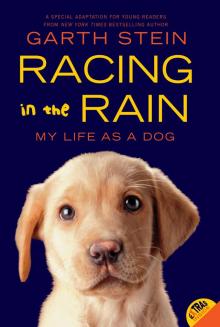 The Art of Racing in the Rain
The Art of Racing in the Rain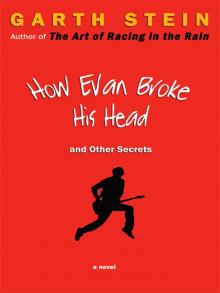 How Evan Broke His Head and Other Secrets
How Evan Broke His Head and Other Secrets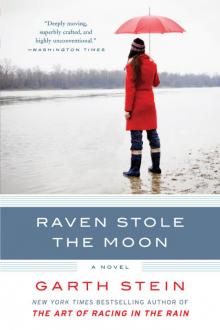 Raven Stole the Moon
Raven Stole the Moon A Sudden Light: A Novel
A Sudden Light: A Novel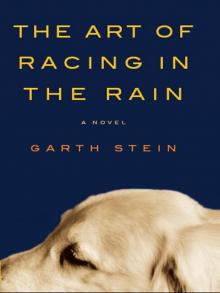 Art of Racing in the Rain, The
Art of Racing in the Rain, The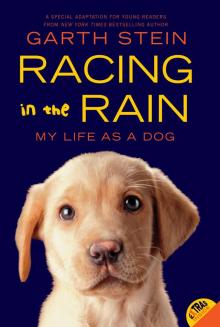 Racing in the Rain
Racing in the Rain